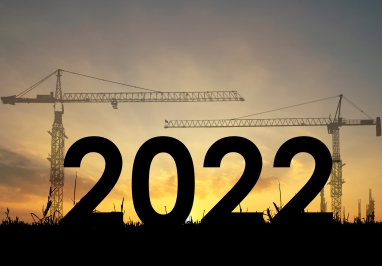
You’ve made it to 2022 and through our countdown of 2021’s construction contracting takeaways! Now is the time to take all the lessons you learned in 2021 and create some goals for 2022. To help, we’ve compiled a list of contracting resolutions to help you ring in the new year. Make 2022 a success by keeping these top 5 construction contracting resolutions in mind when negotiating construction projects:
1. Know who you are contracting with, even outside of your contract.
Do your due diligence and research the project participants. Is the owner a single purpose LLC? Does the owner have risky financing? Does the general contractor have a lot of experience in the region? Have you worked with the general contractor before? Can you determine the solvency of any of the Project participants to know whether the Project is financially healthy and can weather volatility in the market? The financial pressures may come from upstream (owners and general contractors) and downstream (suppliers and laborers), outside your actual contract, and may affect your ability to get paid and perform your work. Know who is on the project before signing your contract and take the time at the beginning of a project to compile all of the other upstream contracts that flow down into yours.
2. Review contracts before you execute them to determine whether you are giving up important rights or assuming too much risk.
Knowing the effect that contract provisions have on your rights and your assumption of risk is a good step in protecting your business. Take care reading and understanding each provision so that you know how it could affect your ability to get paid. For example, you should know whether the contract limits your mechanic’s lien rights and/or whether payment to you by a general contractor is contingent on payment of a general contractor by the owner under a “pay-if-paid” provision. The time spent reviewing your contracts before you enter them can help you negotiate terms that reduce your risk, secure your rights, and save you time and legal fees fighting a construction contract that’s gone sideways. And, remember to review the contract in its entirety. Headings are often misleading and, if relied upon, could cause you to overlook an important provision that affects your ability to get paid.
3. Familiarize yourself with notice requirements.
Construction contracts and subcontracts commonly contain provisions with specific requirements related to changes to payment and work. Knowing how and when you must give notice to a general contractor or owner is vital to ensuring payment for compensable changes to work. Does your contract require notice be in writing or by a particular application? Are you required to give notice seven days (or sooner) after the occurrence of the event or discovery giving rise to the change? Knowing notice requirements and developing an internal system that ensures your compliance with notice requirements can have a big impact on obtaining payment for changes.
4. Negotiate for modifications of risky provisions.
If the circumstances allow, where a construction contract shifts to you more risk than you are willing to bear, negotiate for modifications that better balance those risks. For example, if your contract contains an indemnity provision under which your indemnification obligations are too great or unbalanced, negotiate for an indemnification clause that allocates indemnity obligations based on the pro rata share of responsibility for the loss, or for an indemnification of only losses that are insurable. Vow to work with a legal professional who can help you identify the risk in certain clauses and can offer modifications and/or alternative clauses that are tailored to the level of risk you’re willing to accept.
5. Know the laws affecting your rights and enforce those statutory rights.
States have enacted laws affecting retainage, prompt payment, mechanic’s lien and bond rights, and COVID requirements. Knowing the nuances of those statutes allows you to make sure those rights are preserved under your contracts. For example, in Colorado, separate retainage acts govern private and public contracts and have unique requirements for the laws to apply; but you must understand how those acts apply to your projects before you can enforce your rights under them. Find a way to stay abreast of statutory changes so that you have the upper hand in all your contract negotiations this year.
And, as always, remember to seek help if you need it. The Construction Law Practice Group at Woods Aitken can help you and your team meet these contracting resolutions. We offer risk management seminars that can be tailored to address unique challenges facing a business and can review and draft contracts to aid in your negotiations. We encourage you to subscribe to our Construction Law E-Briefs for the latest construction news, tips, and updates.
